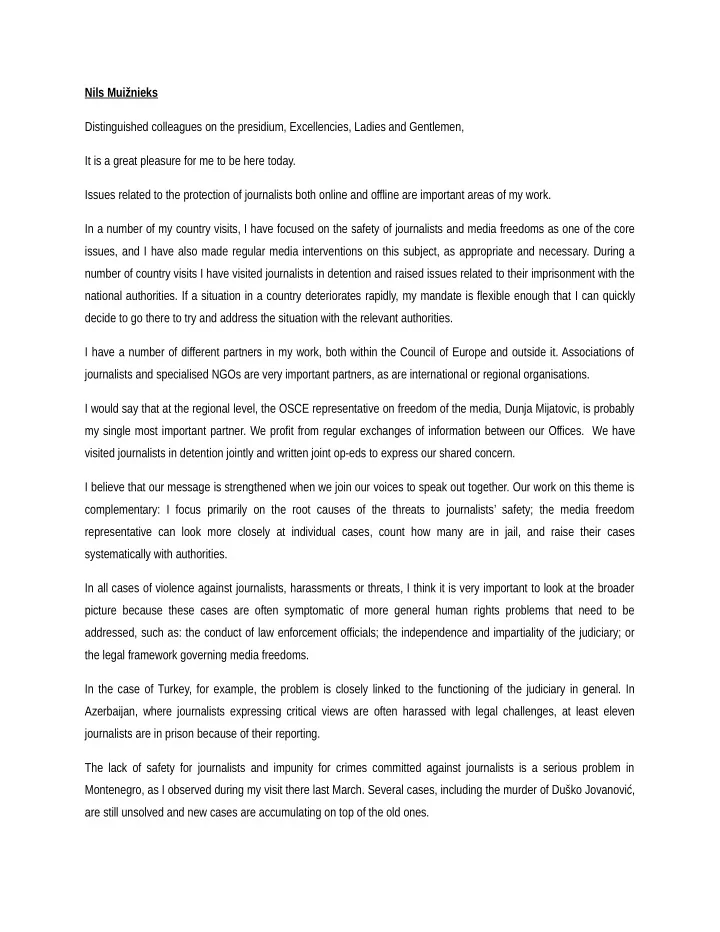

Nils Muižnieks Distinguished colleagues on the presidium, Excellencies, Ladies and Gentlemen, It is a great pleasure for me to be here today. Issues related to the protection of journalists both online and offline are important areas of my work. In a number of my country visits, I have focused on the safety of journalists and media freedoms as one of the core issues, and I have also made regular media interventions on this subject, as appropriate and necessary. During a number of country visits I have visited journalists in detention and raised issues related to their imprisonment with the national authorities. If a situation in a country deteriorates rapidly, my mandate is flexible enough that I can quickly decide to go there to try and address the situation with the relevant authorities. I have a number of different partners in my work, both within the Council of Europe and outside it. Associations of journalists and specialised NGOs are very important partners, as are international or regional organisations. I would say that at the regional level, the OSCE representative on freedom of the media, Dunja Mijatovic, is probably my single most important partner. We profit from regular exchanges of information between our Offices. We have visited journalists in detention jointly and written joint op-eds to express our shared concern. I believe that our message is strengthened when we join our voices to speak out together. Our work on this theme is complementary: I focus primarily on the root causes of the threats to journalists’ safety; the media freedom representative can look more closely at individual cases, count how many are in jail, and raise their cases systematically with authorities. In all cases of violence against journalists, harassments or threats, I think it is very important to look at the broader picture because these cases are often symptomatic of more general human rights problems that need to be addressed, such as: the conduct of law enforcement officials; the independence and impartiality of the judiciary; or the legal framework governing media freedoms. In the case of Turkey, for example, the problem is closely linked to the functioning of the judiciary in general. In Azerbaijan, where journalists expressing critical views are often harassed with legal challenges, at least eleven journalists are in prison because of their reporting. The lack of safety for journalists and impunity for crimes committed against journalists is a serious problem in Montenegro, as I observed during my visit there last March. Several cases, including the murder of Duško Jovanović, are still unsolved and new cases are accumulating on top of the old ones.
Among the most widespread threats to media freedom that I have encountered is police violence against journalists, especially those trying to cover demonstrations. This is quite a serious and preventable phenomenon. Police officers are agents of the state. The state is responsible for making sure that the police do their job well, and that they allow journalists to do their jobs as well. This was an issue in Turkey. During the Gezi events, police used excessive force against demonstrators and journalists, many of whom were injured and had their equipment damaged. When tensions erupted in Ukraine in February during demonstrations hundreds of journalists were attacked, including with stun grenades and rubber bullets. When I was there I heard stories of severe violence against journalists who had been shot in the eye, or the leg and then beaten. There were also many reports of security forces specifically targeting journalists, even though they were clearly identified as members of the press. Policing of demonstrations has sometimes impinged on press freedom in Spain as well. At the end of March this year a group of journalists and photographers who identified themselves as members of the press were beaten by police. Last year, my team actually noted that more than half of all the cases of journalists who were injured were injured by police. This is clearly unacceptable and should stop. The Council of Europe, the OSCE and others dealing with police problems - programmes, police training – must integrate this in our work, because I think we really need to help member states to overcome this problem. Conflict zones. Anne Brasseur mentioned conflict zones. They are also very dangerous places for journalists. The case of Crimea and now eastern Ukraine is emblematic. There we have seen press members being kidnapped, intimidated, denied access and having their material confiscated by armed individuals from various sides. I think the eastern part of Ukraine is now the single most dangerous place for a journalist to work in Europe. A number of journalists trying to do their job there have been killed. However, even in calmer places we see some issues that affect a number of different countries, and that should be addressed, including the criminalisation of defamation. It is a widespread problem, even in so-called old democracies. A second broad problem has to do with attempts to ban or restrict the so called propaganda of homosexuality. Both of these have a chilling effect on journalistic freedom and must be addressed, and I would be very interested to see and hear how other regions in the world have been dealing with these two issues. Inter-regional dialogue is important for learning about best practices. This is why I am particularly glad that the UN and UNESCO are here -
because they are my window to the rest of the world. This is my opportunity to learn what is going on elsewhere, outside of the countries covered by my mandate. Thank you very much for your attention and I wish you a very successful and fruitful discussion today.
Recommend
More recommend